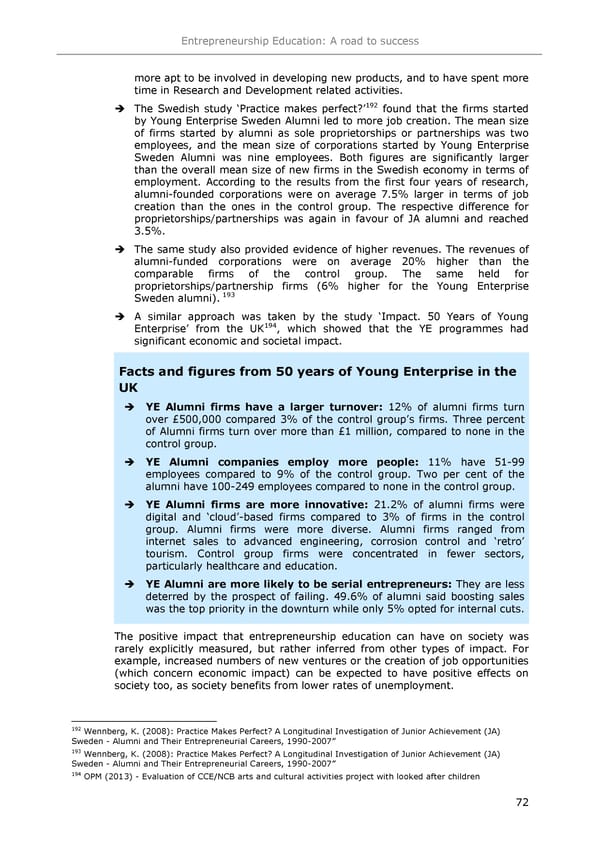Entrepreneurship Education: A road to success more apt to be involved in developing new products, and to have spent more time in Research and Development related activities. 192 The Swedish study 8Practice makes perfect?9 found that the firms started by Young Enterprise Sweden Alumni led to more job creation. The mean size of firms started by alumni as sole proprietorships or partnerships was two employees, and the mean size of corporations started by Young Enterprise Sweden Alumni was nine employees. Both figures are significantly larger than the overall mean size of new firms in the Swedish economy in terms of employment. According to the results from the first four years of research, alumni-founded corporations were on average 7.5% larger in terms of job creation than the ones in the control group. The respective difference for proprietorships/partnerships was again in favour of JA alumni and reached 3.5%. The same study also provided evidence of higher revenues. The revenues of alumni-funded corporations were on average 20% higher than the comparable firms of the control group. The same held for proprietorships/partnership firms (6% higher for the Young Enterprise 193 Sweden alumni). A similar approach was taken by the study 8Impact. 50 Years of Young 194 Enterprise9 from the UK , which showed that the YE programmes had significant economic and societal impact. Facts and figures from 50 years of Young Enterprise in the UK YE Alumni firms have a larger turnover: 12% of alumni firms turn over £500,000 compared 3% of the control group9s firms. Three percent of Alumni firms turn over more than £1 million, compared to none in the control group. YE Alumni companies employ more people: 11% have 51-99 employees compared to 9% of the control group. Two per cent of the alumni have 100-249 employees compared to none in the control group. YE Alumni firms are more innovative: 21.2% of alumni firms were digital and 8cloud9-based firms compared to 3% of firms in the control group. Alumni firms were more diverse. Alumni firms ranged from internet sales to advanced engineering, corrosion control and 8retro9 tourism. Control group firms were concentrated in fewer sectors, particularly healthcare and education. YE Alumni are more likely to be serial entrepreneurs: They are less deterred by the prospect of failing. 49.6% of alumni said boosting sales was the top priority in the downturn while only 5% opted for internal cuts. The positive impact that entrepreneurship education can have on society was rarely explicitly measured, but rather inferred from other types of impact. For example, increased numbers of new ventures or the creation of job opportunities (which concern economic impact) can be expected to have positive effects on society too, as society benefits from lower rates of unemployment. 192 Wennberg, K. (2008): Practice Makes Perfect? A Longitudinal Investigation of Junior Achievement (JA) Sweden - Alumni and Their Entrepreneurial Careers, 1990-2007= 193 Wennberg, K. (2008): Practice Makes Perfect? A Longitudinal Investigation of Junior Achievement (JA) Sweden - Alumni and Their Entrepreneurial Careers, 1990-2007= 194 OPM (2013) - Evaluation of CCE/NCB arts and cultural activities project with looked after children 72
 Entrepreneurship Education Page 75 Page 77
Entrepreneurship Education Page 75 Page 77